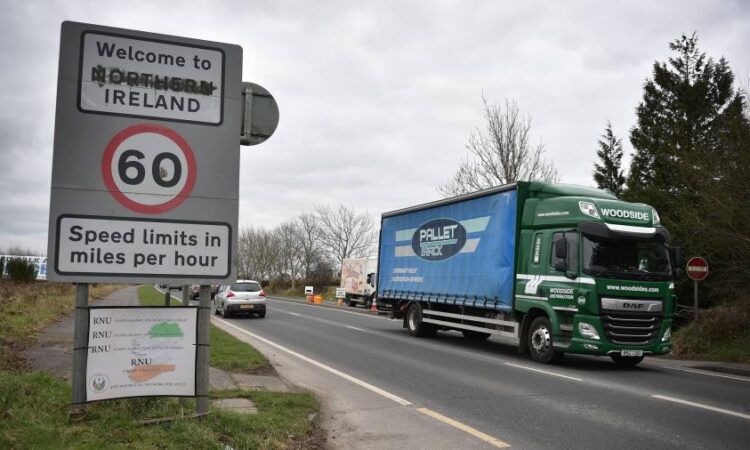
Time is running out to implement the British government’s post-Brexit plans to require all meat and dairy products sold in Northern Ireland to be labelled “Not for EU” consumption, retail and trade lobby groups warned on Wednesday.
The “Not for EU” labels on meat and dairy products are to be phased in from October as part of the Windsor framework agreement on post-Brexit trading arrangements for Northern Ireland that was brokered by prime minister Rishi Sunak earlier this year.
The deal which resolved a longstanding dispute between the UK and the EU over the implementation of the Northern Ireland protocol allows products made to UK standards to circulate in the region so long as they are clearly labelled.
However retailers told an evidence session of the House of Lords European Affairs Committee on Wednesday that the government had been far too slow to share detailed plans of how the system would operate.
Andrew Opie, director of food and sustainability for the British Retail Consortium, which represents the UK’s biggest supermarkets said traders were still in the dark about border processes with only four months to go until the deadline.
“As we stand here today, we have no certainty we will be able to comply with the requirements of the Windsor framework by the first of October deadline. We don’t have sufficient detail. We don’t know how the processes will work,” he said.
Glyn Roberts, the chief executive of Retail NI, the regional lobby group, added that the UK government had been “seriously remiss” in its failure to engage with business. “We’ve had very little of any dialogue with the UK government on the issue of labelling,” he said.
Under the Windsor framework many businesses will be able to use a so-called “green lane” in order to send goods from Great Britain to Northern Ireland as part of a deal to reduce bureaucracy at the Irish Sea trade border that was created by Brexit.
According to the timetable set out in the Windsor framework “Not for EU” labels will be required for meat and fresh dairy products going into Northern Ireland from October this year, and for UHT milk and butter from October 2024. All fruit, vegetables and fish will have to have the labels by July 2025.
All products will also need to carry the labels in Great Britain from October 2024 after the government has consulted with the devolved administrations in Scotland and Wales and passed legislation to bring the new rules into force outside Northern Ireland.
The labels have been criticised by some leading Brexiters, including the former Conservative party leader Sir Iain Duncan Smith who told The Telegraph newspaper that the new requirements were “ludicrous” and should be dropped.
They will also create added complexity for major supermarket chains, like Marks and Spencer, that will now need separate labelling to export products to the Republic of Ireland and the rest of the EU.
Archie Norman, the chair of Marks and Spencer, said that while the Windsor framework would make it easier to send goods to Northern Ireland, the “complexity and cost of having to label products differently for export” would be a “challenge” for companies exporting to Ireland and the EU.
He urged the UK and the EU to devise new digital solutions to simplify processes for business. “Retailers have been operating digitised supply chain systems for decades and we should not settle for a labelling regime belonging to a pre-digital era as a permanent state,” he said.
William Bain, head of trade policy at the British Chambers of Commerce said it was important that the Windsor framework was implemented in full to maintain the recent improvement in EU-UK trade and economic relations.
“We urge the UK government to engage with business on quickly shaping the guidance that will apply on labelling certain food products, and provide financial support on transition costs to suppliers and manufacturers,” he added.
Defra did not immediately respond to a request for comment.






